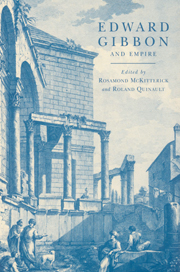Book contents
- Frontmatter
- Contents
- List of contributors
- Preface
- List of abbreviations
- Introduction
- 1 Gibbon and the later Roman Empire: causes and circumstances
- 2 Gibbon and Justinian
- 3 Gibbon and the middle period of the Byzantine Empire
- 4 Byzantine soldiers, missionaries and diplomacy under Gibbon's eyes
- 5 Gibbon and the later Byzantine Empires
- 6 Gibbon and the Merovingians
- 7 Gibbon, Hodgkin, and the invaders of Italy
- 8 Gibbon and the early Middle Ages in eighteenth-century Europe
- 9 Gibbon and the ‘Watchmen of the Holy City’: revision and religion in the Decline and fall
- 10 Gibbon and international relations
- 11 Gibbon's Roman Empire as a universal monarchy: the Decline and fall and the imperial idea in early modern Europe
- 12 The conception of Gibbon's History
- 13 Winston Churchill and Gibbon
- Epilogue
- Index
10 - Gibbon and international relations
Published online by Cambridge University Press: 02 December 2009
- Frontmatter
- Contents
- List of contributors
- Preface
- List of abbreviations
- Introduction
- 1 Gibbon and the later Roman Empire: causes and circumstances
- 2 Gibbon and Justinian
- 3 Gibbon and the middle period of the Byzantine Empire
- 4 Byzantine soldiers, missionaries and diplomacy under Gibbon's eyes
- 5 Gibbon and the later Byzantine Empires
- 6 Gibbon and the Merovingians
- 7 Gibbon, Hodgkin, and the invaders of Italy
- 8 Gibbon and the early Middle Ages in eighteenth-century Europe
- 9 Gibbon and the ‘Watchmen of the Holy City’: revision and religion in the Decline and fall
- 10 Gibbon and international relations
- 11 Gibbon's Roman Empire as a universal monarchy: the Decline and fall and the imperial idea in early modern Europe
- 12 The conception of Gibbon's History
- 13 Winston Churchill and Gibbon
- Epilogue
- Index
Summary
Empire, Enlightenment, the classics: Thomas Ashe Lee, an officer in James Wolfe's regiment, had no sympathy with the Highland rebels in 1746. He wrote, after Culloden, of the British troops ‘dispersed through the several parts of this heathenish country, converting them to Christianity, and propagating a new light among them. Some few of them bring in their arms, others skulk in the woods and mountains, but we take care to leave them no sustenance, unless they can browse like their goats.’ Lee saw the Highlanders as barbarians, compared them unfavourably with the Gauls and sought an historical comparison with the campaign by reading Caesar.
Such a locating of the present with reference to the classical past was commonplace in eighteenth-century Britain, a society whose reverence of and reference to the past was focussed on the classical world. In this context it is easier to understand why Gibbon's scholarship was so important to his contemporaries. A focus on the classical past was scarcely new. Aside from providing an acceptable pedigree and cultural context for civic virtues, the classical legacy was valuable in large part because it was so fluid and open to interpretation that did not fall foul of authority: a marked contrast to that of Christianity. Thus, Reed Browning has been able to suggest that political thought in the first half of the century was divided between Catonic and Ciceronian perspectives.
- Type
- Chapter
- Information
- Edward Gibbon and Empire , pp. 217 - 246Publisher: Cambridge University PressPrint publication year: 1996



